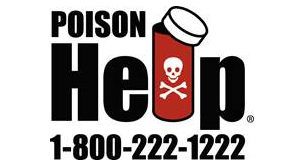More than 2 million people – about half of them under age 6 – swallow or have contact with a poisonous substance each year, according to the American Academy of Pediatrics.
- Be prepared in case of an accidental poisoning; start now: Place the number for the nationwide poison control center – 1-800-222-1222 — on or near every land line telephone in your home. In addition, store the number in every cell phone for all household members. Professionals can be reached 24 hours a day, 7 days a week
- Call the poison control center if you think a child has been poisoned, but is alert and awake. If a person collapses, suffers seizures, has trouble breathing or cannot be roused, call 911 immediately.
Here are some tips to prevent accidental contact with poisonous substances in the home:
- Store all medicine, cleaning and laundry products (including detergent packets), paints, varnishes and pesticides in their original packaging in locked cabinets or containers. Make sure these products are out of sight and out of reach of young children.
- Keep all medicines in containers with safety caps and keep out of reach of children.
- Immediately discard all unused medication. Many communities offer free disposal of medications during “take-back days” in spring and fall. Some pharmacies offer the service year-round.
- Remember that safety caps are designed to be child resistant, but are not childproof – there is a huge difference between the two.
- Never refer to medicine as “candy” or another harmless name.
- Check the label each time you give a child medicine to ensure proper dosage. And don’t use a kitchen spoon to deliver medicine; use a clearly marked medicine spoon or a calibrated dosing syringe. Your doctor or pharmacist can advise you of the appropriate method for the medication prescribed and the age of the child.
- If you use an e-cigarette, keep the liquid nicotine refills locked up out of children’s reach and only buy refills that use child-resistant packaging. A small amount of liquid nicotine spilled on the skin or swallowed can be fatal to a child.
- Never place poisonous products in food or drink containers.
- Keep coal, wood or kerosene stoves in safe working order.
- Maintain working smoke and carbon monoxide detectors. Check the batteries at least several times a year.
- Secure devices with small batteries such as hearing aids, remote controls, key fobs, greeting cards and musical children’s books. These types of devices may contain small button-cell batteries that can cause injury if ingested.
Some first aid treatments:
If someone is unconscious, not breathing or having convulsions or seizures due to poison contact or ingestion, call 911 or your local emergency number immediately. If your child has come in contact with poison and has mild or no symptoms, call Poison Help at 1-800-222-1222.
Different types and methods of poisoning require different, immediate treatment; call 911 for immediate assistance:
- Swallowed poison – Take the item away from the child, and have the child spit out any remaining substance. Do not make your child vomit. Do not use syrup of ipecac.
- Swallowed battery – If your child has swallowed a button-cell battery, seek treatment in a hospital emergency department immediately. Serious tissue damage can occur in as little as 2 hours.
- Skin poison – Remove the child’s clothes and rinse the skin with lukewarm water for at least 15 minutes.
- Eye poison – Flush the child’s eye by holding the eyelid open and pouring a steady stream of room temperature water into the inner corner for 15 minutes.
- Poisonous fumes – Take the child outside or into fresh air immediately. If the child has stopped breathing, start cardiopulmonary resuscitation (CPR) and do not stop until the child breathes on his or her own or until emergency personnel take over.
More information:
American Association of Poison Control Centers
Centers for Disease Control and Prevention
Article compliments of The Cincinnati Insurance Company/By Steve Heiden
This loss control information is advisory only. The author assumes no responsibility for management or control of loss control activities. Not all exposures are identified in this article. Neither The Cincinnati Insurance Company, Bolder Insurance, nor its affiliates or representatives offer medical advice. Consult with your doctor or pharmacist about your specific situation.


HI Bolder Insurance ,
This was a well outstanding informative post you have shared on this page about the Safety tips for parents and caregivers with the use of child health insurance services because i think people about half of them under age 6 swallow or have contact with a poisonous substance each year, according to the American Academy of Pediatrics.
Thanks.